HEALTHCARE - THE INDUSTRY THAT REACHES EVERYBODY
Healthcare business intelligence is the process by which large scale data from the massive healthcare industry can be collected and refined into actionable insights from 4 key healthcare areas: costs, pharmaceuticals, clinical data, and patient behavior. If there is one industry in the world that reaches everybody, it is the healthcare industry. With the power to save lives, this industry must be on a continual path towards excellence. That means constantly working to progress, cut costs and improves medicines, patient care, research, and education. This information gleaned by healthcare analytics software like datapine gives invaluable insights that would otherwise be unavailable and has the power to not just improve the performance of the industry, but also to save lives.

"We were amazed how easy it was to use datapine and get the first KPIs within a couple of minutes. An average Excel user can configure and work with datapine with zero IT overhead."
Sebastian Diemer
SIMPLIFYING HEALTHCARE BI
Peoples’ lives are too important to accept mediocre medical care and only moderate improvements. With the help of a modern healthcare dashboard and healthcare analytics, both can extrapolate potentially lifesaving information and must be constantly monitored and followed.
- Keep up with imperative, industry-wide changes that affect profits
- Avoid excessive waiting times that damage patient-doctor relationships
- Recognize and balance patients’ needs as well as those of medical staff
- Optimize patient care and revenue streams
- Take advantage of real-time data for real-life situations

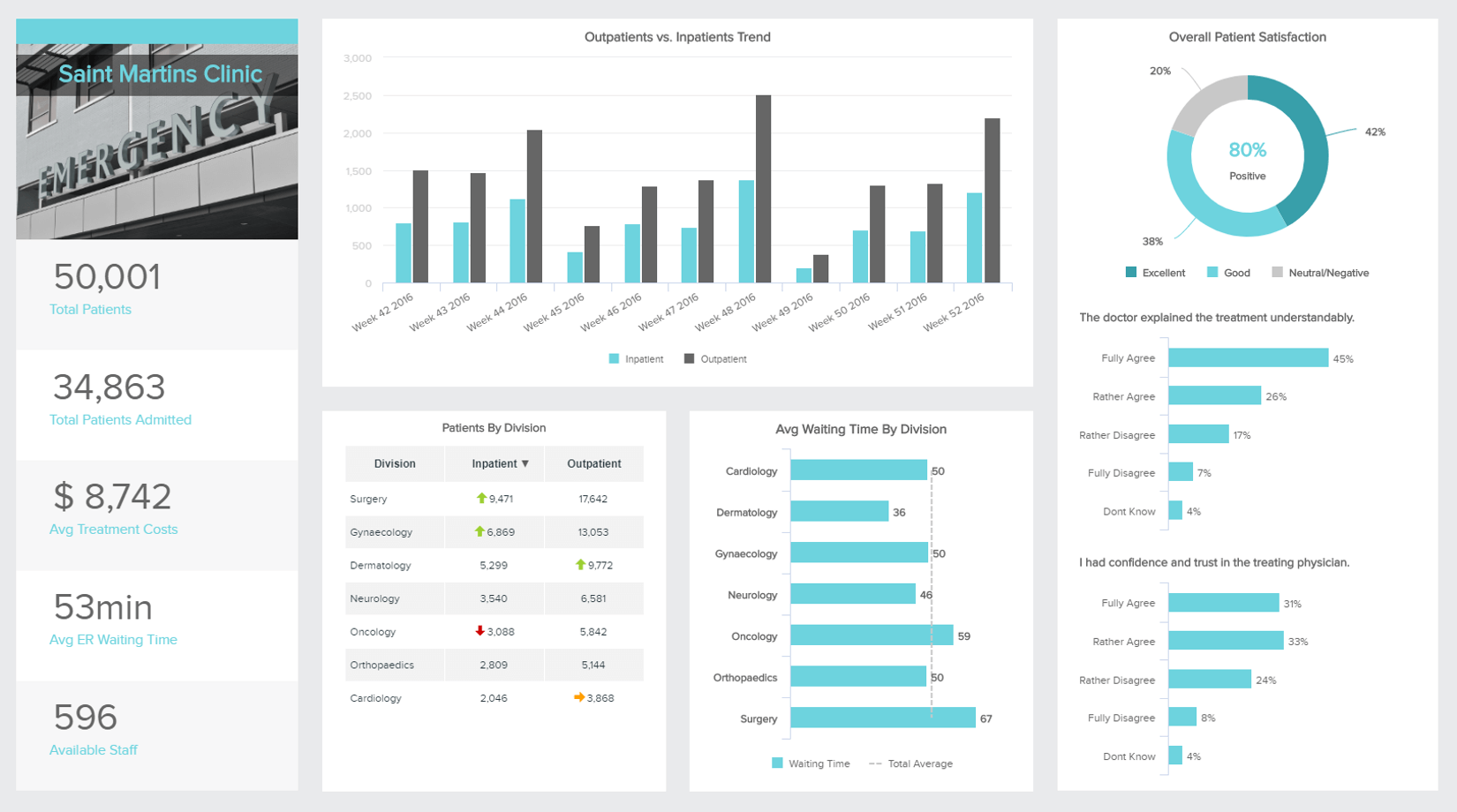
Become a data wizard within less than 1 hour!
UTILIZE BUSINESS INTELLIGENCE IN HEALTHCARE
Business Intelligence in healthcare ensure better clinical performance and correspondingly better patient outcomes. Analytics tools and BI mitigate the effect of errors clerically, financially and above all else on patient health; readmissions and misdiagnoses are avoided. It allows for a reduced operating cost while delivering higher quality services without compromising patient safety or medical staff satisfaction. Modern business intelligence software for healthcare encourages a culture of transparency, improving performance, accountability and protecting the medical institution itself. It helps to accurately predict demand for services and workforce supply and planning in case of unforeseen situations that could not have otherwise been expected. Healthcare analytics software enables you to develop a thorough patient analysis, giving doctors robust insights and ultimately improving patient care. Moreover, it improves data management and sharing, reducing time spent not treating patients or ensuring their health and satisfaction. All in all, analytics guarantee a better final outcome: safe and healthy patients.
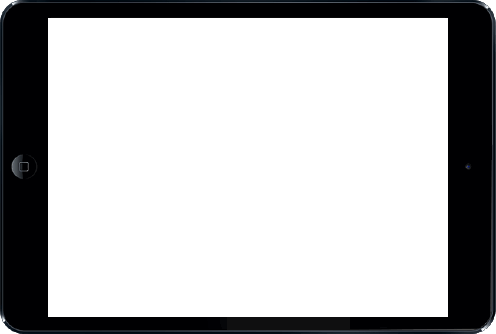
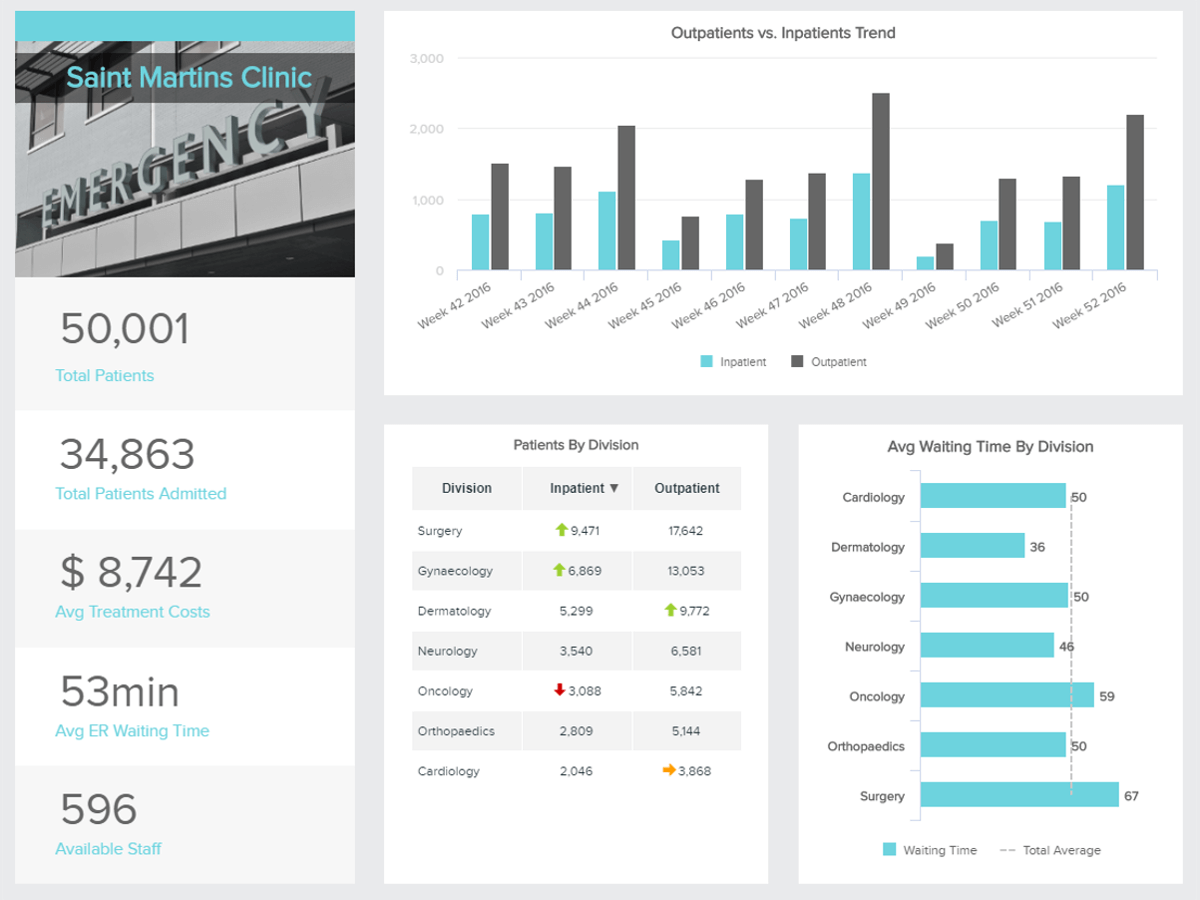

Check out these 12 real-life examples of big data in healthcare that can save people’s lives.
Read Blog Article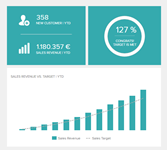
Mute the noise of your healthcare data to focus on insightful and impactful KPIs.
View KPIs
Get an evaluation! Want to talk to us about how datapine can help your business?
Get in touchWHAT IS HEALTHCARE ANALYTICS SOFTWARE?
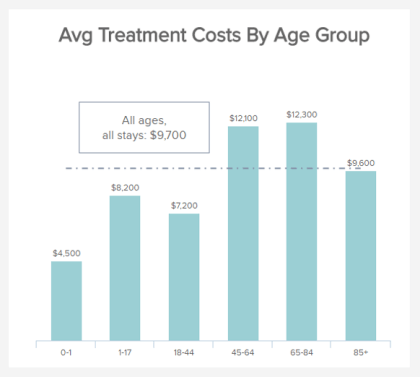
Healthcare analytics software is a term used to describe collections of data in order to help managers to improve operational performance, clinical outcomes, overall efficiency and quality of hospital and healthcare services by utilizing healthcare analytics tools. In order to perform successfully and improve patients’ care, a hospital must take charge of a wide range of insights, from hospital management, costs, diagnoses, and patient records. All of the big data in healthcare must be handled in the most discreet way, respecting patients’ privacy and sensible information.
Handling endless paperwork can be easily organized and managed by using a healthcare analytics software, and by choosing right healthcare metrics that create a stable data management environment and improves staff productivity while increasing patients’ satisfaction levels. In order to do so, professionals should utilize healthcare analytics tools that can connect various data sources and provide a stable management environment in which patients, doctors, nurses, families, and everyone involved in delicate situations should feel safe. That being said, business intelligence software for healthcare can utilize data to predict how many patients are expected to be received in a hospital on a daily and hourly basis, thanks to machine learning abilities and intelligent forecasts.
THE BENEFITS OF BUSINESS INTELLIGENCE IN HEALTHCARE
There are numerous ways and benefits of using healthcare data analytics software and these are just some worth mentioning:
Financial planning: Allocating funds helps financial managers and employees to do it more efficiently, decreasing possibilities for fraud activities and payment issues. Automated database systems, and intelligent data alerts can achieve maximum transparency in the finance department and enable administrators to create an efficient analysis environment. For healthcare organizations to address operational, financial, patient care, and clinical practices most effectively, they must implement healthcare analytics solutions that allow them to make the most of their analytical capabilities and address core challenges within the industry.
Evaluating performance: Healthcare BI software can easily track hospital activities and generate analysis based on operational inefficiencies that would otherwise stay unnoticed. Specific actions can be taken after careful consideration of collected data that can enable decreased costs. A hospital in South Carolina found that they could save almost $500,000 annually by simply discharging patients half a day early, according to the US News and World Report.
Patient satisfaction: We have already established the importance of increasing patient satisfaction levels. Incorporating analytics with the right software enables not just administrators to handle mundane tasks much easier, but also keeping updated patients’ records that can remind patients to keep a healthy lifestyle based on their conditions, and decrease repetitive medical tasks.
Coordinating communication: Often times, patients require consultations from different specialists which can cause lack of sharing information between them since their busy schedule can cause a gap in communication processes. By utilizing healthcare analytics software, patients’ data, current progress, and medical history can be reviewed at any time, and any place, with the only requirement of having an Internet connection. Therefore, each individual working on the case can have updated information on their fingertips, with real-time data. Readmissions can be significantly reduced, and coordination of the medical cases improved by quickly addressing crucial patients’ data.
Managing reputation: The healthcare industry needs agile, fast, responsive, and interactive BI software for healthcare to maximize the value of their data and support critical areas of decision making. Having the ability to accurately analyze data related to new patient acquisition, patient safety, readmissions, hospital-acquired conditions, and patient willingness to recommend, can drive performance across all departments. Basically, business intelligence in healthcare allows organizations to build a reputation around patient and clinical care, create a solid foundation built on insights, better address patient concerns, and drive collaboration throughout all departments.
Predicting the future: With advanced analytics, business questions have evolved from “what happened” to “why” and “what will happen in the future”. They give healthcare institutions the power to ask important questions about the future, and not simply rely on historical data to inform their decision-making – and this is enabled by the application of business intelligence in healthcare. Having foresight enables healthcare management to take preventative, proactive steps towards providing the best care for patients, and ensuring that all levels and elements of their facility are able to effectively deliver high-quality treatment.
Supporting and improving decision-making: Healthcare administrators and managers face specific issues related to system operations, equipment and facilities, diagnostics, patient and clinical care, and physician practices, all of which requires efficient coordination. Healthcare organizations need the support of a hospital business intelligence software to navigate the complexities of facility governance. Additionally, advanced analytical capabilities are necessary to solving key challenges and connecting patient, clinical, and operational data. BI in healthcare allows administrators to track key performance indicators (KPIs) that analyze, manage, and help healthcare organizations adapt their performance based on accurate data and analytics-based insights.
Data visualization: Visualizing data is the key component in selecting the right business intelligence for healthcare solution, whether your facility or organization. When BI users can easily understand healthcare information, apply insights towards addressing risks, forecast future events, and answer vital areas of care, management, and operation, chances for successful application of analytics-based insights are increased. The numerous examples of big data in healthcare illustrate it every day. Providing better clinical care, improving personnel distribution, decreasing readmissions, and managing expenses require smart business intelligence healthcare application. The true value for healthcare stems from providing the best level of care for patients based on well-analyzed data.
Utilizing healthcare BI tools is part of the growth process for the healthcare industry, and will enable hospitals and other organizations to establish best practices across all elements of care and management. With the constantly increasing number of data sources and the complexity of data generated within healthcare organizations, the need for advanced analytics to support decision-making capabilities is growing. Hospitals and other organizations require predictive modeling, online data visualization, and modern healthcare business intelligence software applications to gain insights regarding patient care and satisfaction, labor distribution, clinical operations, daily practices of physician and nurses, and administration and management.
Elevating care throughout all departments and becoming a value-based organization can only be achieved through the intelligent application of data-derived insights obtained thanks to comprehensive, advanced BI software.
WHAT IS THE ROLE OF HEALTHCARE ANALYTICS TOOLS?
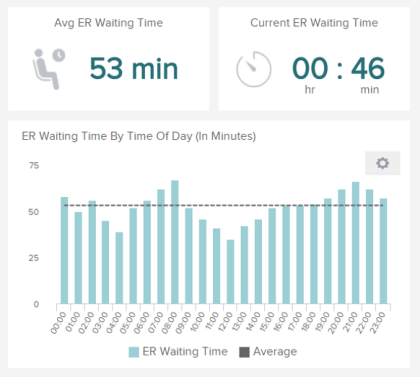
In the last decade, healthcare organizations invested millions of dollars to create armies of administrative tasks and activities that had the goal of making better decisions and improving patients’ outcomes, but consequently didn’t increased efficiency. Analysis processes didn’t have improved technologies to create a quicker, safer, and more productive impact on the overall healthcare system and ensure cost-effective and healthy results. More and more data are collected, and more patients need care because of factors such as aging population or shortage of qualified physicians, nurses, and caregivers. These trends continue to grow, and healthcare analytics tools help the system to consolidate and manage the operational and strategic decisions every hospital is faced to confront in today’s digital age.
Emerging technologies like predictive analytics, artificial intelligence, and machine learning are transforming healthcare paradigms and cause impact directly on our lives. Access to healthcare facilities is a basic human need. However, the costs of the healthcare sector are one of the most expensive in the world, whether it is privately or publicly held. Under such circumstances, how can analytics increase efficiency? With implementing healthcare analytics software that can impact each process along the way.
Become a data wizard in less than 1 hour!
